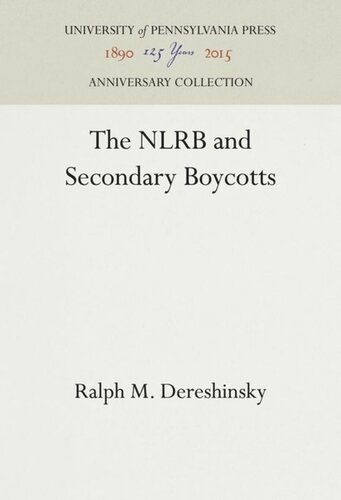

Most ebook files are in PDF format, so you can easily read them using various software such as Foxit Reader or directly on the Google Chrome browser.
Some ebook files are released by publishers in other formats such as .awz, .mobi, .epub, .fb2, etc. You may need to install specific software to read these formats on mobile/PC, such as Calibre.
Please read the tutorial at this link: https://ebookbell.com/faq
We offer FREE conversion to the popular formats you request; however, this may take some time. Therefore, right after payment, please email us, and we will try to provide the service as quickly as possible.
For some exceptional file formats or broken links (if any), please refrain from opening any disputes. Instead, email us first, and we will try to assist within a maximum of 6 hours.
EbookBell Team

5.0
18 reviewsAs unions increasingly resort to corporate campaigns, top-down organizing, neutrality agreements, and consumer boycotts, it is easy to forget that federal labor laws were designed to eliminate the causes of substantial obstructions to the free flow of commerce.
Our global economy continually shows that the fortunes of different companies increasingly are interdependent. At the same time, federal labor laws in the U.S. place important restrictions on secondary boycotts—defined as picketing or other union efforts based on one company's dispute to disrupt the affairs of other companies and consumers. Secondary boycotts have played an even more important role in the construction industry, where union disputes often affect dozens of employers working at a single location. Secondary boycotts present among the most complex problems dealt with by U.S. labor laws.
This book examines how federal law limits secondary picketing and comparable activity, while preserving First Amendment free speech rights and protecting primary union activity, even though picketing or pressure directed toward one company almost always affects other parties and people. Ralph M. Dereshinsky looks at the development of labor law, National Labor Relations Board decisions, and court reviews relating to four types of secondary boycott situations. A case-by-case analysis is made to determine the direction and consistency of Board and cournt handling of labor-management disputes over common-situs picketing, allied employer picketing, consumer boycotts, and hot-cargo agreements.